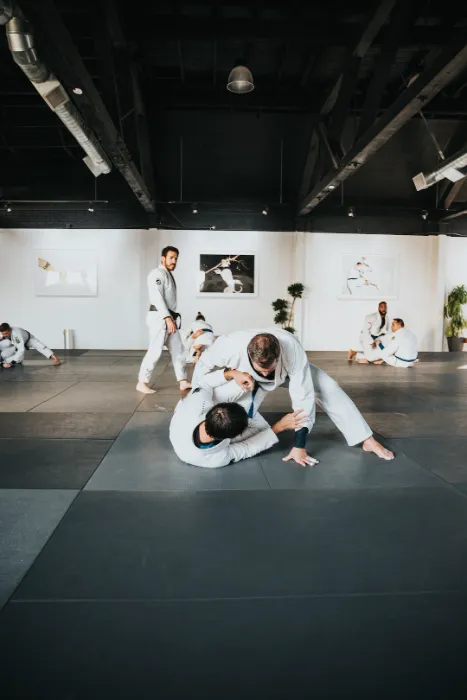Maximize Your Martial Arts Potential with Kettlebell Training

Kettlebell training can be a powerful addition to any martial artist's regimen, providing a unique blend of strength, flexibility, and cardiovascular conditioning that is highly relevant to martial arts. The dynamic nature of kettlebell exercises makes them particularly useful for martial artists looking to improve their power, speed, and explosive movements, which are critical in combat sports and self-defense scenarios.
The Synergy of Kettlebell Training and Martial Arts
Kettlebells aren't just another piece of fitness equipment; they are, in many ways, akin to the dynamic, fluid movements found in martial arts. The standard kettlebell swing, for example, mimics the hip hinge movement fundamental to many martial arts techniques, such as kicks, punches, and throws. When a martial artist trains with kettlebells, they're not only building muscle, they're enhancing the neuromuscular connections that make for more efficient and powerful movement patterns.
Strength That's More Than Just Muscle
In martial arts, it's not just the size of the muscles that matters—it's how you use them. Kettlebell exercises often involve multiple muscle groups and require the body to work as a cohesive unit. This is especially beneficial for martial artists who need to generate power from their core and transfer it through their limbs, which is the essence of many striking and grappling techniques.
Explosive Power and Endurance
Explosive power is crucial in martial arts. The rapid acceleration of a kettlebell during exercises like snatches and clean and jerks can help martial artists develop the explosive strength necessary for fast, powerful strikes and takedowns. Furthermore, the endurance built by longer kettlebell circuits can be invaluable during sparring sessions or competitions where fatigue can mean the difference between victory and defeat.
Flexibility and Mobility
Martial artists require a great deal of flexibility and mobility, and kettlebell workouts can complement this need. Movements such as the Turkish get-up not only build strength in a range of motion but also challenge the body's flexibility and control, which can enhance a martial artist's ability to perform high kicks, deep stances, and advanced techniques.
Injury Prevention
The functional strength gained from kettlebell training can also be a form of injury prevention. By strengthening the muscles around critical joints and improving overall stability, martial artists can better protect themselves against the common injuries that come from repetitive impacts and the occasional awkward landing or twist.
Integrating Kettlebells into Martial Arts Training
For the martial artist looking to incorporate kettlebells into their training, it's important to start with the basics. Mastering the kettlebell swing, Turkish get-up, clean, press, and snatch with proper form will lay the foundation for a beneficial kettlebell practice. From there, integrating kettlebells into a circuit training format can simulate the rounds of a fight, mixing in bodyweight exercises, combat drills, and kettlebell movements.
Conclusion
The beauty of kettlebell training for martial arts lies in its versatility and its ability to closely mimic the demands of martial arts on the body. For the martial artist seeking to elevate their physical capabilities, kettlebells offer a path to greater strength, power, and endurance—all crucial elements for excellence in the dojo, ring, or on the street. As with any training program, it should be tailored to individual needs and aligned with one's martial arts goals, ensuring a harmonious blend of strength and technique.
Frequently Asked Questions (FAQ) about Kettlebell Training for Martial Artists
Q1: Can kettlebell training improve my martial arts technique?
A1: Yes, kettlebell training can enhance your martial arts technique by improving your strength, power, flexibility, and endurance, all of which are essential for executing martial arts movements effectively.
Q2: How often should I train with kettlebells as a martial artist?
A2: It depends on your martial arts and fitness goals, but generally, 2-3 kettlebell sessions per week can complement your martial arts training effectively without leading to overtraining.
Q3: What weight should I start with when using kettlebells?
A3: Beginners should start with a lighter weight to focus on form—typically 8-12 kg for men and 6-8 kg for women. As your technique and strength improve, you can gradually increase the weight.
Q4: Are kettlebell exercises safe for all ages?
A4: Kettlebell exercises can be safe for most ages if performed with proper form and an appropriate weight. However, it is advisable for children and seniors to seek professional guidance before starting.
Q5: What are the best kettlebell exercises for martial artists?
A5: Swings, snatches, clean and jerks, Turkish get-ups, and goblet squats are highly beneficial for martial artists due to their emphasis on full-body movement and explosive power.
Q6: Do I need a kettlebell instructor, or can I learn on my own?
A6: While there are resources available to learn on your own, working with a qualified kettlebell instructor, especially in the beginning, can help ensure you learn the correct technique and reduce the risk of injury.
Q7: How long does it take to see results from kettlebell training?
A7: Results can vary, but with consistent training and proper nutrition, you may start to see improvements in strength and conditioning within a few weeks.
Q8: Can kettlebell training help with weight loss?
A8: Yes, the high-intensity nature of kettlebell workouts can lead to significant calorie burn and increased metabolic rate, aiding in weight loss and body composition changes.
Q9: Should I do kettlebell training before or after martial arts practice?
A9: It's generally best to do kettlebell training after martial arts practice when your body is already warmed up, or on separate days to avoid fatigue and maintain the quality of your martial arts training.
Q10: Are there any specific dietary recommendations while doing kettlebell training?
A10: A balanced diet rich in protein, complex carbohydrates, and healthy fats, along with proper hydration, will support your kettlebell training and recovery. It's also important to tailor your diet to your specific training demands and health goals.
